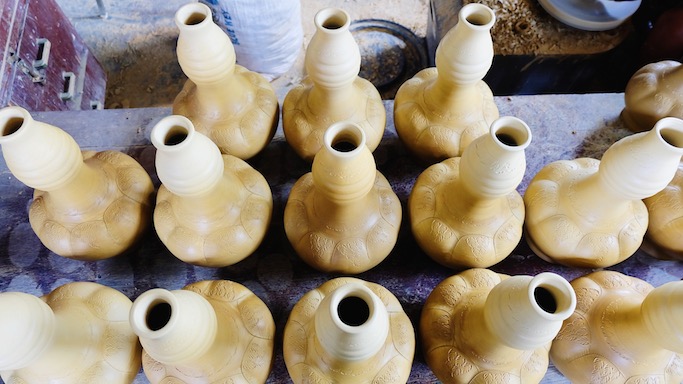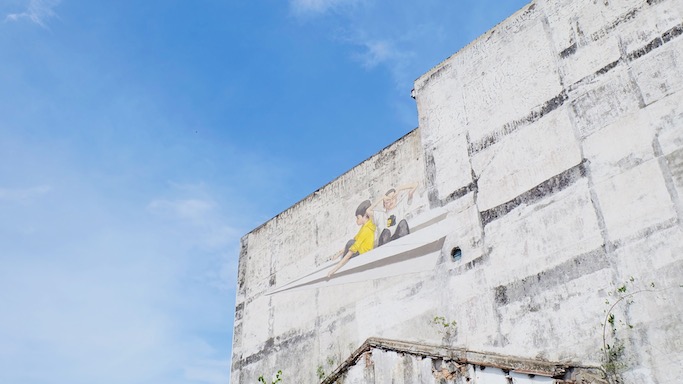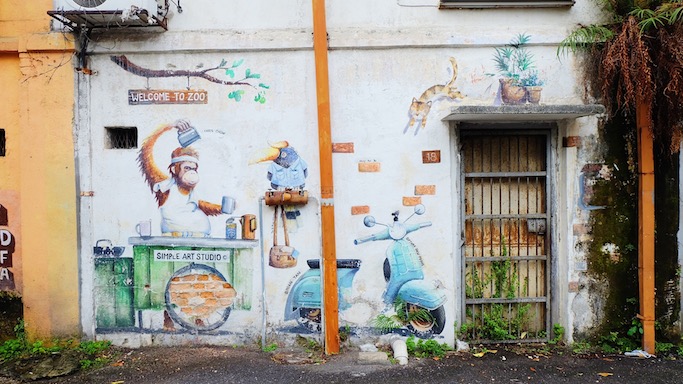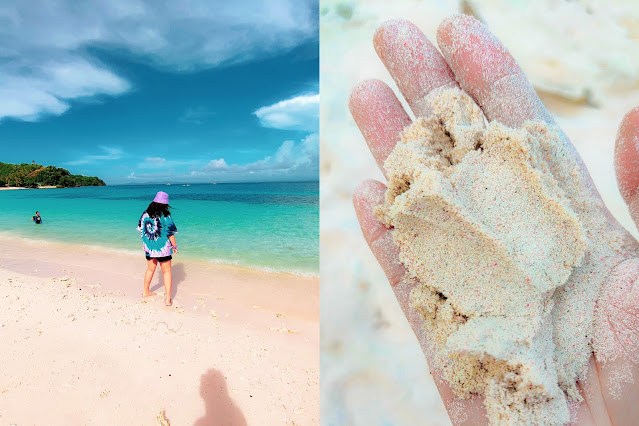Perak, Malaysia may be more known for their FOOD, but the town also has a hidden talent yet to be uncovered by you (the tourist) - it is also very ARTSY. A place-to-be for those who love to keep their Instagram feeds consistent, yet still brimming with stories and content. During our first day, the whole afternoon was spent just around the city, walking, taking in the feel and vibe of a place we're all visiting for the first time.
First impressions last, as they say. And since day one, Perak showed me that here's an underrated state, ready to welcome you.

Ipoh Wall Art Murals by Ernest Zacharevic
Ernest Zacharevic, the artist behind Penang's famous Georgetown murals, also left his mark in Perak at the Art of Oldtown. Tourists go here for photo ops, and true enough, our group claimed na "quota na sa picture!" by the end of the day. This is also part of Ipoh's Heritage Walk.
Here are the 4 out of the 7 Ernest Zacharevic murals in Ipon:
1) Old Uncle with Coffee Cup
2) Paper Plane
3) Kopi "O" - celebrates Ipoh as the birth place of white coffee.
4) Hummingbird
Concubine Lane
Here's a street in Ipoh (capital city of Perak) that reminded me of Singapore's Haji Lane.
Why the intriguing name? In 1892, parts of Ipoh was rebuilt because of a fire, and three streets owned by rich mining tycoon Yao Tet Shin were given away to his three wives. The locals named the streets after these wives, thus they have the Wife Lane, the Concubine Lane, and the First Concubine Lane! Ang direchahan lang!
Today, the Concubine Lane is the most popular and developed. Tourists go here for the cafes, restaurants, knick-knacks, and even for the photogenic corners in this street. Sadly, I don't know how the Wife Lane looks like, but this is definitely an attraction.
Saw one old house in Concubine Lane:
The Street Art of Ipoh
We walked a bit more around the alleys of Jalan Sultan Iskandar and Jalan Masjid before going for dinner. I like this lane, and although too tired to pose and quota na sa OOTD, I actually learned a lot about this state through art and our tour guide Paul's childhood stories. He grew up here, making the experience more personal.
So we took more pictures, reminding everyone na kung hindi ngayon kelan pa? In a way, the street art of Ipoh was an icebreaker to the group as we all love to take pictures so bawal magkahiyaan baka pagsisihan!

Lion Dance:
Thaipusam Kavadi:
Erica joining the game of hide and seek:
Unconditional love of a parent:
Jolo playing skipping rope:
"Simple Art Studio"
Jaypee standing next to a painting of the big red rafflesia flower that can be found in Malaysia:
Group photo!
Perak Architecture
A British-colonized country, you'll see the European and Victorian influences while looking at Perak's buildings and architectural designs. I blurted that Ipoh has its own charm, I just can't pinpoint it yet, but I like it!
Tenaga Nasional:
A building covered with vines:
Ipoh's bridge, connecting the old town to the new:


Inside, it looks like any train station:
Equally grand is the Ipoh tree just outside the train station, and the Municipal Hall:

Perak's Sultan Azlan Shah created the Sultan Azian Shah Gallery, a former royal palace now converted into exhibition halls featuring the life of the 34th sultan of Perak. Photos are not allowed inside, but what you'll see are the sultan's luxury vehicles, clothes, passport, family treasures, LV trunks, etc.
The place has a Renaissance, neo-classical style of architecture, surrounded by beautiful, elaborate gardens:

Perak's Labu Sayong Pottery
We were introduced to the Labu Sayong during our lunch at the Gua Tempurung Outdoor Camp. They served our water in these black clay jars, and was informed that these earthenware containers give the water medicinal values that can cure common ailments, lower blood pressure, etc.
Another interesting trivia is that the Labu Sayong keeps their drinking water cool:
From the itinerary sent to us before this trip, we all agreed that we were most excited about the POTTERY activity. We visited the studio of KZ Kraf during our third day, and learned more about this Malaysian traditional craft heritage:
From KZ Kraf's studio, we drove for less than 5 minutes to the source of their clay:

It was like visiting their backyard:
The soil-clay's texture felt nice and cool:
The labu sayong terracotta clays are also sourced in riverbanks. Imagine how easy and inexpensive it is to get these raw materials, but we pay for the hard work and creativity that goes into the craft.
After that, we went back to another part of the studio for the production:
The raw materials were mixed and churned in these giant barrels:
They already have moulds for the bulb-shaped labu sayong water containers:
When almost dry, the jars go through the hands of KZ Kraf's artisans for the designing. They work so fast with the rotating wheel, parang ninja, but the designs are all still perfect!

They gave us a chance to work on our own labu sayong designs, and it was so much fun! It looks easy when you're just watching, but actually harder to do since the jars are still a bit soft - there's a tendency to over-punch the pattern stamps! Less than five minutes, and the boys already created holes in their jars (art yan!). :D
We enjoyed this, and took a long time finishing our creations.
Sir KZ Kraf demonstrating how he carves the jar, ang galing!
Here's my attempt! It looks simple, but it took me a long time to finish, hehe!
After the stamping comes the coloring. The labu sayong jars are usually black; they are baked and buried to have that color.
After sun drying, the ceramics undergo three levels of heat in this big kiln:
And then fresh from the oven, the jars go straight under these rice husks:
And after a few more minutes, they get the elegant ebony color!
Just fresh from the oven!
When the jars are already cool, they glaze its bottoms with resin to make them more waterproof. The labu sayong is then ready to store drinking water or be used as decorative pieces at home.
Back at the workshop, we were also able to play with the pottery wheel! It was my FIRST TIME to try this, and the experience is therapeutic and even addicting! A bit difficult, but something that I'd like to repeat again and again till perfected.
Ahhh... the steady spinning wheel, while the cool mud run against my fingers, slowly following the shape that I try to command. I hope I can do this again someday!
Erica loves the pottery wheel as well! She was our teacher for the day, haha!

Sir KZ Kraf approves of my Yakult jar, HAHA!
We were all able to take home our outputs, and although transporting something fragile is very challenging, it is worth it as I love seeing my first pottery work on display whenever I pass by it here in our house.
For an actual art experience while in Malaysia, visit KZ Kraf's Pottery Workshop at No.20 KG Kepala Bendang Sayong, 33040 Kuala Kangsar Perak. Email kzkraf2u@gmail.com, and follow him on Instagram @kzkraf for sample works and classes. Thank you, Sir, for welcoming us to your workshop!
If you ask me, there's nothing like getting to know a person through his art, so maybe it's the same with a place? You get to know beyond the plain facts that you only see or read online, and maybe even have that privilege to take a peep to the secrets of its soul.
Next up: Water and cave adventures that you have to try when in Perak!
Book your next flight via AirAsiaPhilippines, visit http://www.airasia.com.
Read more of my Perak Malaysia posts HERE.
Read more of my Perak Malaysia posts HERE.

































































































2 Comments
Ganda ng photos! Mukhang inspiring ang Perak. Gusto ko din i-try ang pottery. Mukha nga syang relaxing.
ReplyDeleteDi ko sya ineexpect from this trip but super artsy nga ng Perak.:) Thanks for reading!!!
DeleteYour turn! Always excited to read your comments! :)